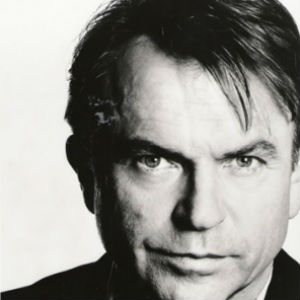
Sam Neill has appeared in more than 60 feature films, from Kiwi classics and British dramas to Hollywood blockbusters. He also co-directed the acclaimed CINEMA OF UNEASE (1995), a documentary about New Zealand film which The New York times labelled the highlight of the Century of Cinema series.
Sam Neill entered the world as Nigel Neill, born in Omagh, Northern Ireland in 1947. His father was a third generation New Zealander serving in the British Army, who returned home to join the family liquor business in 1953.
Growing up in the antipodes, Neill received as close to a classic English education as it was possible to get, attending Anglican boy’s secondary school, Christ College, in Christchurch. Along with his family background, this no doubt helped set Neill in the mould of the urbane English gent he would play many times in his career. But growing up in a far off colony also gave Neill his point of difference – a sense of belonging somewhere ‘else’, which also comes through strongly in his work.
He loved movies, especially anything by Alfred Hitchcock, and involved himself in drama; acting was a talent that came easily to him. As well as performing at school, Neill took part in the annual Shakespearian productions put on by celebrated novelist Dame Ngaio Marsh.
Neill’s thespian ambitions blossomed while studying for a BA in English at Canterbury University. He joined a travelling theatre troupe, the Players’ Drama Quartet, and spent a year with them, criss-crossing New Zealand in a mini-bus.
Neill then joined the Government-owned National Film Unit, and over the next six years gained a grounding in all aspects of documentary production. He directed roughly nine shorts there, a number of which played before movies in theatres – including FLARE; A SKI TRIP, and SURF SAIL, which followed the first crossing of Cook Strait by wind surfers. He also directed pieces on Ian Athfield (ARCHITECT ATHFIELD) and the Red Mole theatre troupe (RED MOLE ON THE ROAD).
Neill continued to participate in fringe theatre productions and short films, including Barry Barclay’s ASHES. His feature film debut came with LANDFALL (1974). Directed by Neill’s Film Unit colleague Paul Maunder, the experimental feature followed four people who attempt to live an alternate lifestyle. Little seen in New Zealand, LANDFALL won the top award at the Pacific and Asian Film Festival in Shiraz.
Neill put the experience to good use when his ASHES performance helped him win the leading role in breakthrough NZ feature SLEEPING DOGS (1977). His performance as man on the run from a totalitarian Government was perfectly in synch with the material. New Zealand audiences saw an everyman hero to whom they could relate. But more importantly for Neill’s later trajectory, international audiences recognised his star quality as well.
A fork in the road came with an offer to star in Gillian Armstrong’s MY BRILLIANT CAREER (1979) – a title that would be prophetic for Neill. The move to Australia saw him spend time in prosaic Australian TV shows like THE SULLIVANS, but it got him noticed. One of those who saw his potential was veteran English actor James Mason.
Mason recognised kindred qualities in the young man from New Zealand. Not only did he recommend Neill for the lead role of the Anti-Christ in third OMEN movie THE FINAL CONFLICT; Mason also bought him “an air ticket to Europe and found me an agent”. Starring opposite fellow Kiwi Lisa Harrow, Neill’s strong performance helped bring him to the attention of filmmakers beyond the Antipodes.
But it was his starring role in hit British TV series, REILLY: ACE OF SPIES (1983) that consolidated Neill’s reputation, in the process earning him a Golden Globe nomination for Best Actor.
Neill followed REILLY with a mix of European art movies, films in Australia, and television productions on both sides of the Atlantic. Over coming years he worked with directors Wim Wenders, Claude Chabrol, and Fred Schepisi (EVIL ANGELS). Neill starred opposite Sean Connery in THE HUNT FOR RED OCTOBER, and fellow Kiwi John Clarke in memorable Australian comedy DEATH IN BRUNSWICK. In the process he became a dependable, even bankable leading man, but Neill’s star was set to rise still further in one extraordinary year.
In 1993 Neill played one of the scientists in Speilberg blockbuster Jurassic Park, and followed it with a powerful performance as a stuck-in-the-mud colonial in Jane Campion classic The Piano. Remembering the later, Neill told The Guardian, “it was very hard to do that movie, chopping off your wife’s finger in a rainstorm in the mud. Could have a bad effect on you. Holly Hunter was such a firebrand. She fought back like buggery. After three takes I was absolutely exhausted”.
Neill has continued to play a wide range of roles across different genres, exhibiting a consistent ability to woo audiences, whether playing hero, villain, or the wizard Merlin (for which he was nominated for a Golden Globe). He has even won the pop culture accolade of being a guest on The Simpsons (in an episode on the show’s fifth season).
Neill has regularly starred or co-starred in Australian productions (TV’s ROBBERY UNDER ARMS, DEAD CALM, SIRENS, THE DISH, LITTLE FISH, John Clarke’s STIFF. After more than 14 years working beyond New Zealand shores, he returned home to shoot THE SINKING OF THE RAINBOW WARRIOR (playing real-life Superintendent Allan Galbraith) and THE PIANO. Since then he has joined Kiwi director Gaylene Preston for romantic thriller PERFECT STRANGERS (2003) and NO.2 director Toa Fraser for award-winner DEAN SPANLEY (2008) – playing the title role of a very unusual priest, opposite screen legend Peter O’Toole. The following year Neill starred as the mysterious Mr Jones in Jonathan King’s retooling of Kiwi sci-fi classic UNDER THE MOUNTAIN (a clip of his work in the film can be seen here).
Neill returned to his birthplace of Northern Ireland to film TV series THE TUDORS. 2011 saw him due to appear in a wide range of projects; from the partly Kiwi-shot disaster tale Ice, to JJ Abrams time-travelling drama ALCATRAZ, to acclaimed Tasmanian-set feature THE HUNTER, opposite Willem Dafoe.
The 1995 documentary, CINEMA OF UNEASE, co-directed by Neill with Judy Rymer, remains a definitive, though contentious, study of New Zealand’s “dark and brooding” cinema and culture. The film was made as part of a series of international documentaries marking 100 years of cinema.


